| | | | | | | | | | | Axios World | | By Dave Lawler ·Mar 10, 2022 | | Welcome back to Axios World. - We start tonight (1,901 words, 7 minutes) in Moscow, with stops in South Korea, Venezuela, Georgia and Burkina Faso.
🎧 Heads-up: Episode two of our "How it Happened" podcast on Putin's invasion will be out on Friday morning. Get both episodes here. | | | | | | 1 big thing: Russians feel new Iron Curtain close in | 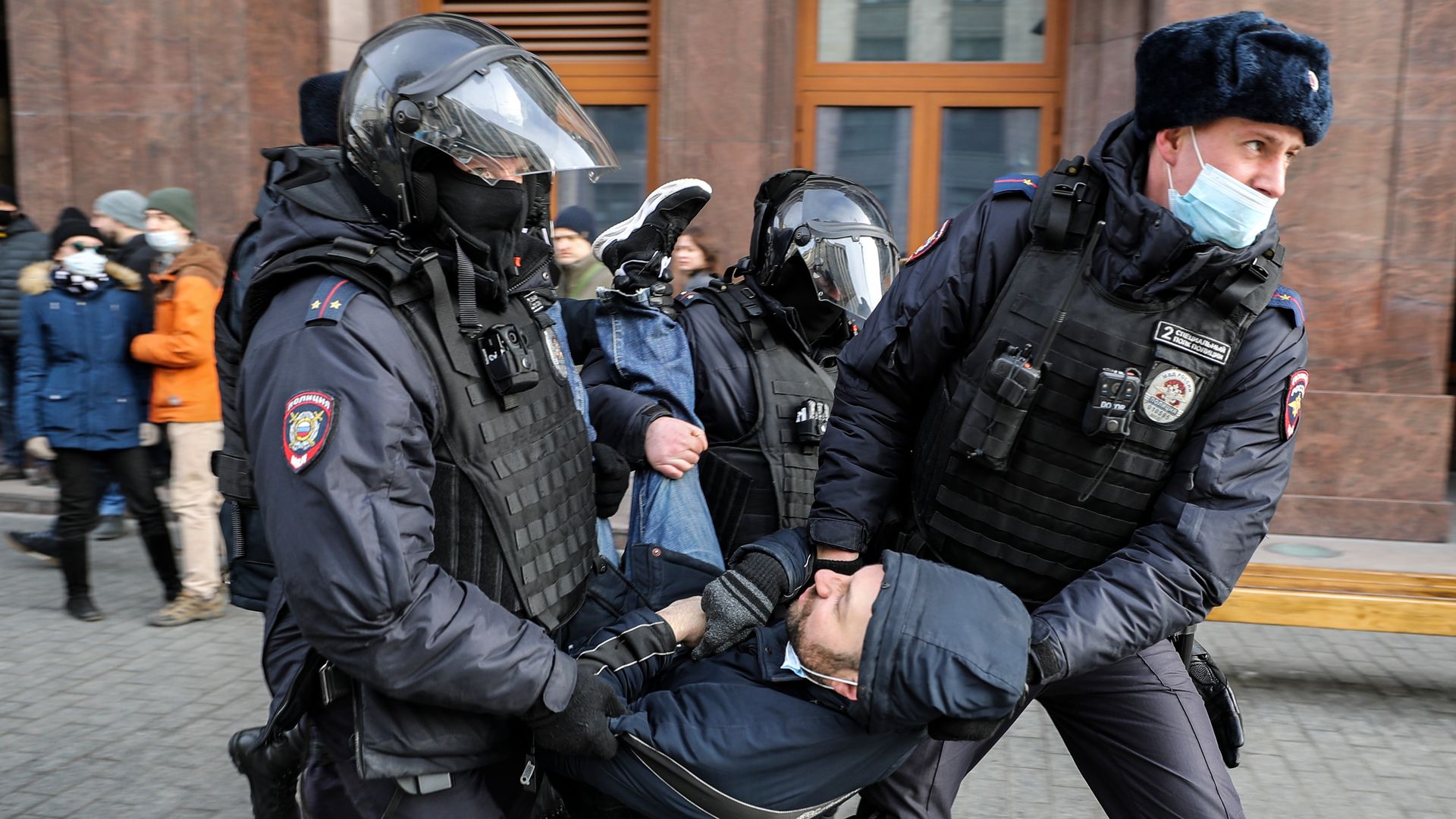 | | | Russian police arrest a protester in Moscow on Sunday. Photo: Vladimir Pesnya/Epsilon/Getty | | | | Two weeks ago, middle-class Russians could work at and buy from the biggest global firms, plan holidays in the West, get their news from vibrant (if embattled) independent outlets, and post as they pleased on social media. State of play: With a new law promising prison time for journalists who so much as call Vladimir Putin's war a "war," foreign and domestic outlets are ceasing operations. Western firms are leaving. Social media platforms are disappearing. Borders are tightening. Protesters are being jailed en masse. - "It's over," says Alexander Baunov, a senior fellow at Carnegie Moscow. "All the vestiges of liberalism will be purged."
"The rules were clear and they are not anymore," Baunov says. "We can't say what is dangerous and what is not. You don't know what sort of repression you can meet for the things that were tolerated before." - Educated Russians knew they were living in an autocracy, he says. Many had made peace with that. But they never expected to once again live in the type of country where "portraits of the Great Leader" hang on the walls.
- People who work in journalism, the arts or for global firms are watching their career prospects evaporate. Russians have fled the country by the tens of thousands.
- Educated Russians have long discussed the conditions under which they might emigrate, he says. For many, border closures, social media shutdowns and "the deglobalization of Russia" were their red lines, he says. Others simply feel that they can't live as normal in a country that is attacking its neighbor.
Yes, but: That is, of course, a subset of the population. One independent poll cited in the Washington Post puts approval for the war at 58%, with 23% disapproving. - Many Russians never shopped at IKEA, drank Starbucks coffee or watched Netflix, and thus won't feel the shift as keenly.
- When the financial sanctions start to bite, many will be prepared to accept the Kremlin line that they are victims of economic warfare from the West that has nothing to do with the war in Ukraine, Baunov says.
- Sanctions have already pervaded daily life and conversations in a way they never did in 2014, but he's not expecting them to push more Russians into the street. "The fear of repression is much higher than the discontent the sanctions make."
But Russians aren't entirely cut off from the West, or from the truth about the war. - Telegram, the widely used social media app, is still operational. Online, Russians are flocking to virtual private networks.
- But Putin could still be fairly confident that when Russian forces bombed a maternity hospital in Mariupol — just 35 miles from Russia — only a sliver of the population would ever see the gruesome images, or believe their country was responsible.
The bottom line: The past two weeks were in some ways a step back in time. Coca-Cola, McDonald's and Disney are leaving. A new Iron Curtain is taking shape. |     | | | | | | 2. Global elections roundup | 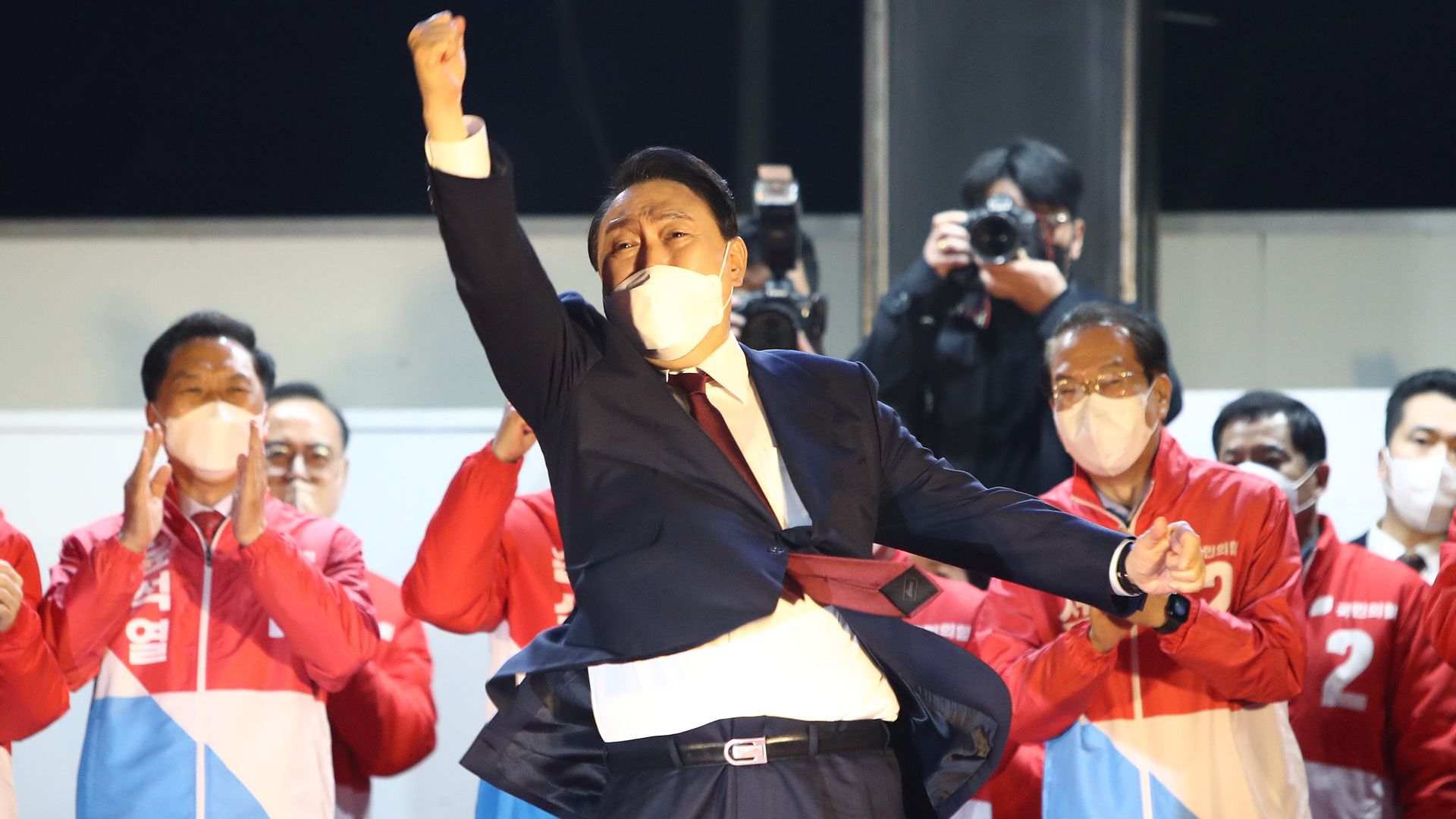 | | | South Korean President-elect Yoon Suk-yeol celebrates with supporters. Photo: Chung Sung-Jun/Getty Images | | | | 1. Yoon Suk-yeol, a conservative who previously served as South Korea's top prosecutor, was elected as the country's next president yesterday by a margin of just 0.7%. - Yoon will bring a hardline perspective to the North Korea portfolio after five years of detente under Moon Jae-in. Moon is far more popular than either top candidate to replace him, but he was ineligible to run (presidents serve a single five-year term).
- Yoon is also more hawkish on China, and he places greater emphasis on the defense relationship with the U.S. He'll also face the challenge of smoothing out relations with Japan.
2. India's ruling Bharatiya Janata Party (BJP) won four state elections, including a crucial victory in India's largest state, Uttar Pradesh, further solidifying the Hindu nationalist party as the country's dominant political force. - Yogi Adityanath, a hardline Hindu monk and the party leader in Uttar Pradesh, is viewed as a potential successor to Prime Minister Narendra Modi. He has been accused of whipping up animosity against Muslims.
- It was yet another humiliation for Congress, the secular party that was once India's dominant political force but is now no rival for the BJP nationally.
3. Chile's new leadership is set to be inaugurated tomorrow with a batch of mostly young political leftists and independents, Axios Latino co-author Marina E. Franco writes. - Gabriel Boric, who just turned 36, has promised to remake Chile, moving it from a neoliberalist model to one centering on "social justice." His ambitious plans will hinge on congressional support, which is still uncertain.
4. With three weeks to go until Hungary's general election, Fidesz, led by right-wing populist Prime Minister Viktor Orbán, leads a broad opposition alliance by 6 points in the most recent poll. |     | | | | | | 3. State of the war |  Data: Institute for the Study of War; Map: Jared Whalen/Axios Russian Foreign Minister Sergei Lavrov and his Ukrainian counterpart Dmytro Kuleba discussed the possibility of a meeting between their two presidents during talks on Thursday, but otherwise failed to come to an agreement on a ceasefire, Axios' Zach Basu reports. Driving the news: Kuleba said his top priority during the 1.5-hour talks was establishing a humanitarian corridor for Mariupol, a port city in southern Ukraine where Russian forces destroyed a maternity ward and children's hospital on Wednesday as part of a brutal, weeklong siege. - A senior Pentagon official told reporters this evening that Russian forces appear to have cut off and surrounded both Mariupol and Chernihiv, a city of 300,000 in northern Ukraine that has also faced days of heavy bombardment.
- Russian forces have made progress in the advance on Kyiv, the official said, moving within 3 miles of the capital from the north, with more troops approaching from the northeast and west.
In a somewhat unexpected twist, Israeli Prime Minister Naftali Bennett is attempting to mediate between Putin and Volodymyr Zelensky, Axios' Barak Ravid reports. - The leaders of Germany, France and Turkey are also in touch with both sides, and South African President Cyril Ramaphosa spoke to Putin today and said he'd been "approached to play a mediation role."
- President Biden has no plans to speak with Putin, however. His administration isn't even attempting diplomacy with Russia, believing Putin has no interest in off-ramps, per the Washington Post.
- But the U.S. is also wary of provoking Putin, hence the decision not to help Poland send warplanes to Ukraine.
Meanwhile, the UN says more than 2.3 million refugees have now fled Ukraine, Axios' Erin Doherty writes. - 1.4 million have fled to Poland. Adjusted for population, that's like another Ohio's-worth of people arriving in the U.S.
Go deeper: |     | | | | | | A message from Axios | | Recruit top talent with Axios Local | | |  | | | | Axios Local now has job boards in the fastest growing cities in America. Reach smart professionals that use Axios Local daily to make decisions about where to work, what to do and where to live. Post your job opening on Axios Local. | | | | | | Bonus: Where in the world? | 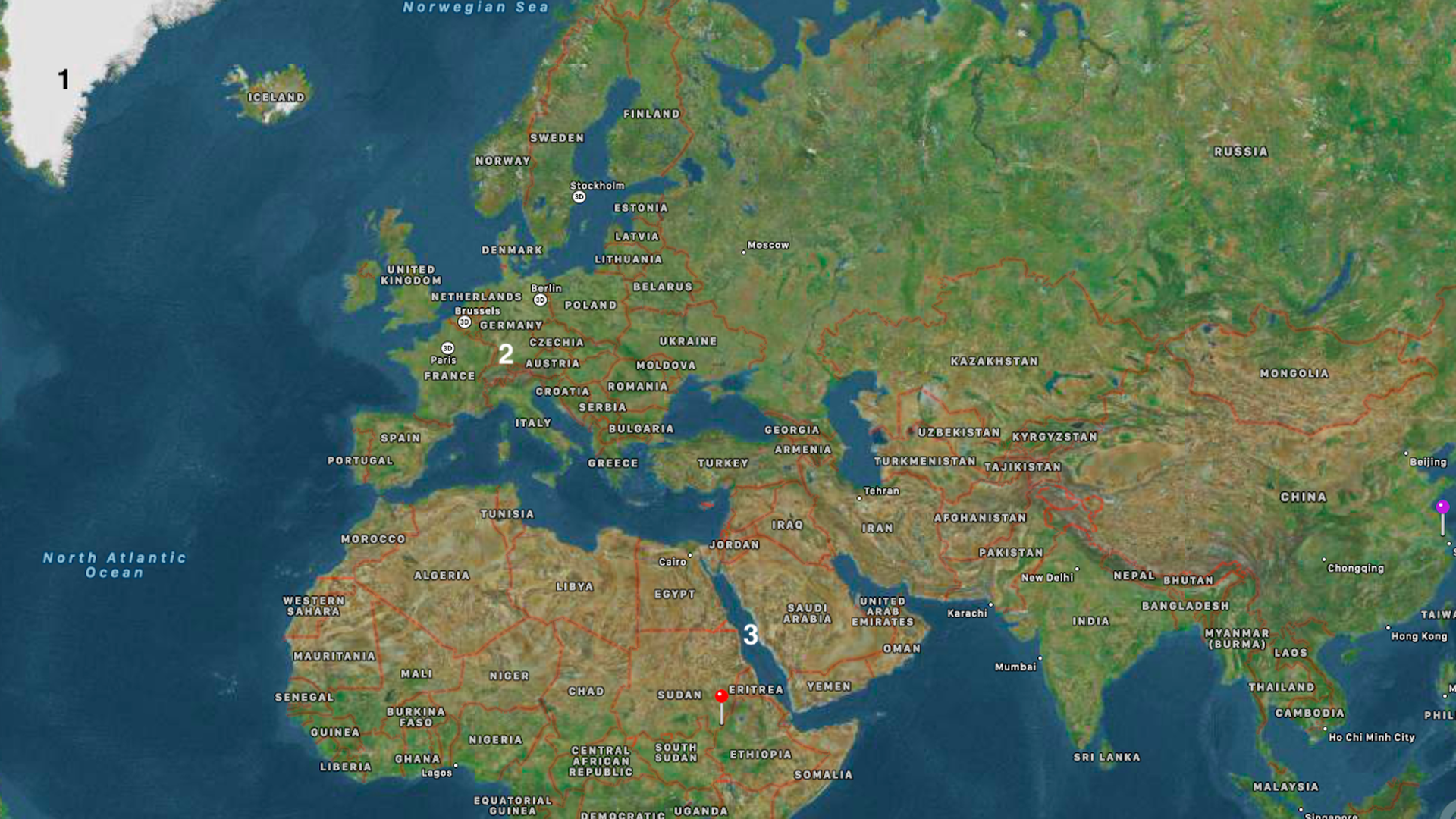 | | | Screenshot via Apple Maps | | | | Our puzzle is pretty simple this week — our five stops were all named for colors. For example, if there were a famous Purple Plateau, I would have included it. - Hint: The two marked with pins are rivers. Can you name them all?
Scroll to the bottom for the answers. |     | | | | | | 4. White House denies it's discussing oil and sanctions with Maduro | 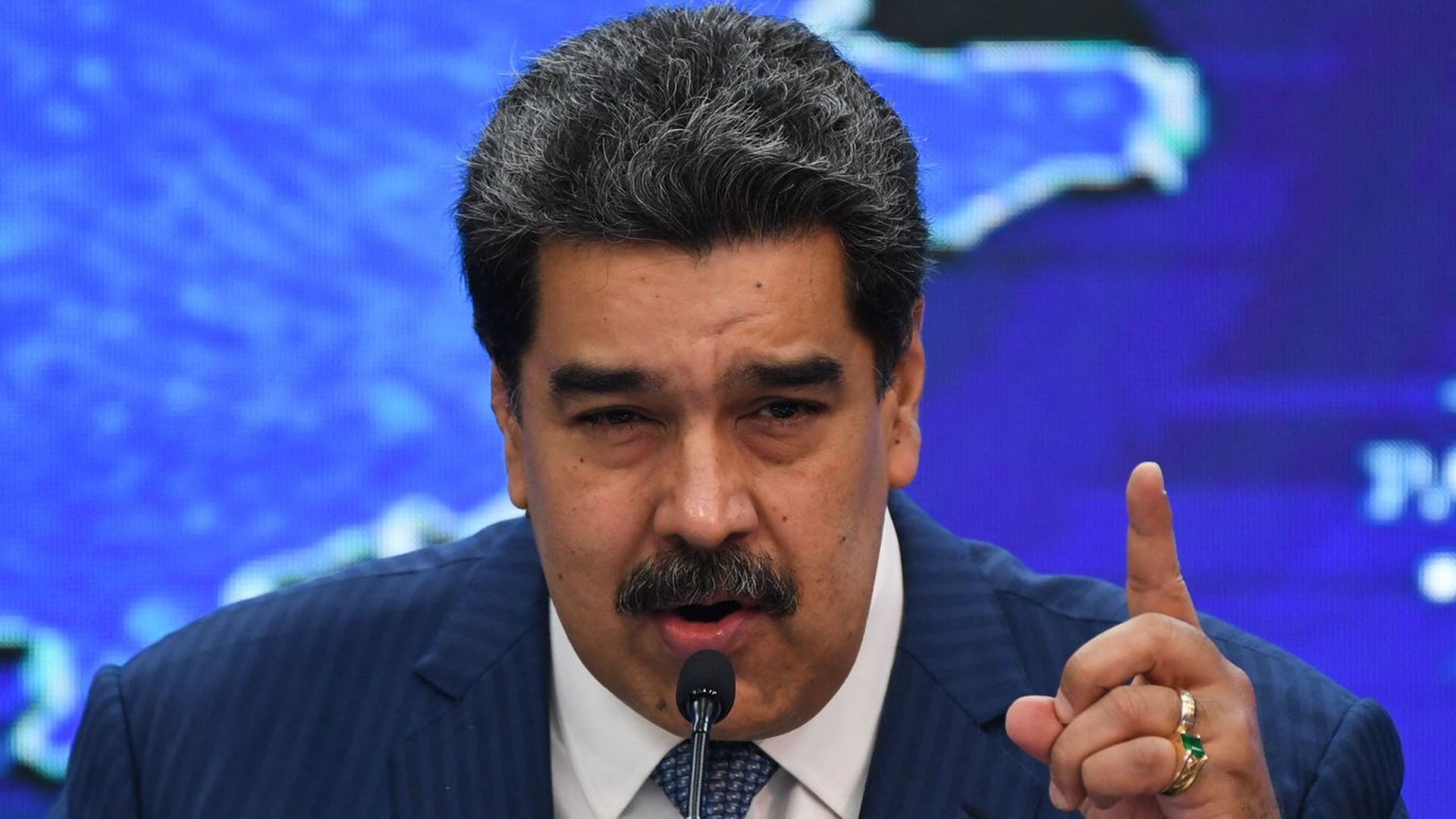 | | | Photo: Federico Parra/AFP via Getty Images | | | | The White House claims there is "no dialogue" about oil or sanctions underway with Nicolás Maduro's regime in Venezuela, even as U.S. officials made a rare trip to Caracas on Saturday at a time when the administration is scrambling to increase global oil production, Axios' Oriana Gonzalez writes. Driving the news: Maduro released two American hostages this week following the meeting, potentially heralding a thaw in relations. But the reengagement with Maduro has sparked backlash from some lawmakers in Washington, who fear President Biden is about to relax sanctions to get more Venezuelan oil into the market. A senior Biden administration official told reporters on Wednesday that the talks had only two objectives: to secure the release of the detainees and to urge the regime to return to the negotiating table with the Venezuelan opposition. - White House press secretary Jen Psaki reiterated Thursday that "there is not currently, at this moment, an active conversation about importing their oil."
Between the lines: The war in Ukraine and Biden's decision to ban oil, gas and coal from Russia are causing gas prices to spike and forcing the U.S. to reappraise its relations with other controversial oil producers, such as Saudi Arabia. - Venezuela's oil production has fallen sharply due to U.S. sanctions and mismanagement of the sector by Maduro, but it is one of the few countries that could significantly ramp up supply.
The other side: The U.S. still recognizes Juan Guaidó as the legitimate president of Venezuela, not Maduro. - Guaidó's interim government released a statement on Wednesday thanking the U.S. for its help in trying to restart the negotiations but arguing that sanctions shouldn't be lifted until there are "actual advances towards democracy and Venezuela's freedom."
Meanwhile, Maduro earlier this week said the meeting with the U.S., which lasted around two hours, was "respectful, cordial and very diplomatic." He didn't say exactly what was discussed. |     | | | | | | 5. Ukraine invasion spurs Georgia to apply for EU membership |  | | | A speech by Ukrainian President Volodymyr Zelensky is streamed live in front of Parliament during a rally in support of Ukraine in Tbilisi, Georgia, on March 4. Photo: Daro Sulakauri/Getty Images | | | | Georgia formally applied for EU membership last week — two years ahead of schedule, as domestic support for Ukraine galvanized calls to look West, Axios' Bethany Allen-Ebrahimian reports. Why it matters: Leaders in the Republic of Georgia hope that the shockwaves caused by Russia's invasion will spur reluctant EU members to admit longtime aspirants like Georgia, Ukraine and Moldova. - "In making this historic decision, Georgia stands firmly beside Ukraine and its Euro-Atlantic aspirations amid the unprovoked Russian military invasion of the country," the Georgian Embassy in Washington, D.C., said in a statement.
- The former Soviet republic sits geographically on the divide between Europe and Asia, but has come to view its identity as a part of Europe.
- Yes, but: Some EU member states doubt that Georgia can meet the bloc's standards on issues like anti-corruption and clean elections, and they worry that pressure would grow to admit other prospective members.
State of play: Allegations of democratic backsliding under the ruling Georgian Dream party have also jeopardized the country's relationship with the EU. What to watch: Georgia's path to EU membership is far from secured, but former Georgian Defense Minister Tina Khidasheli told Axios she hopes European countries will be inclined to "do something to prove that Russia does not have veto power." Go deeper. |     | | | | | | 6. What I'm reading: Sankara assassination trial approaches a verdict | 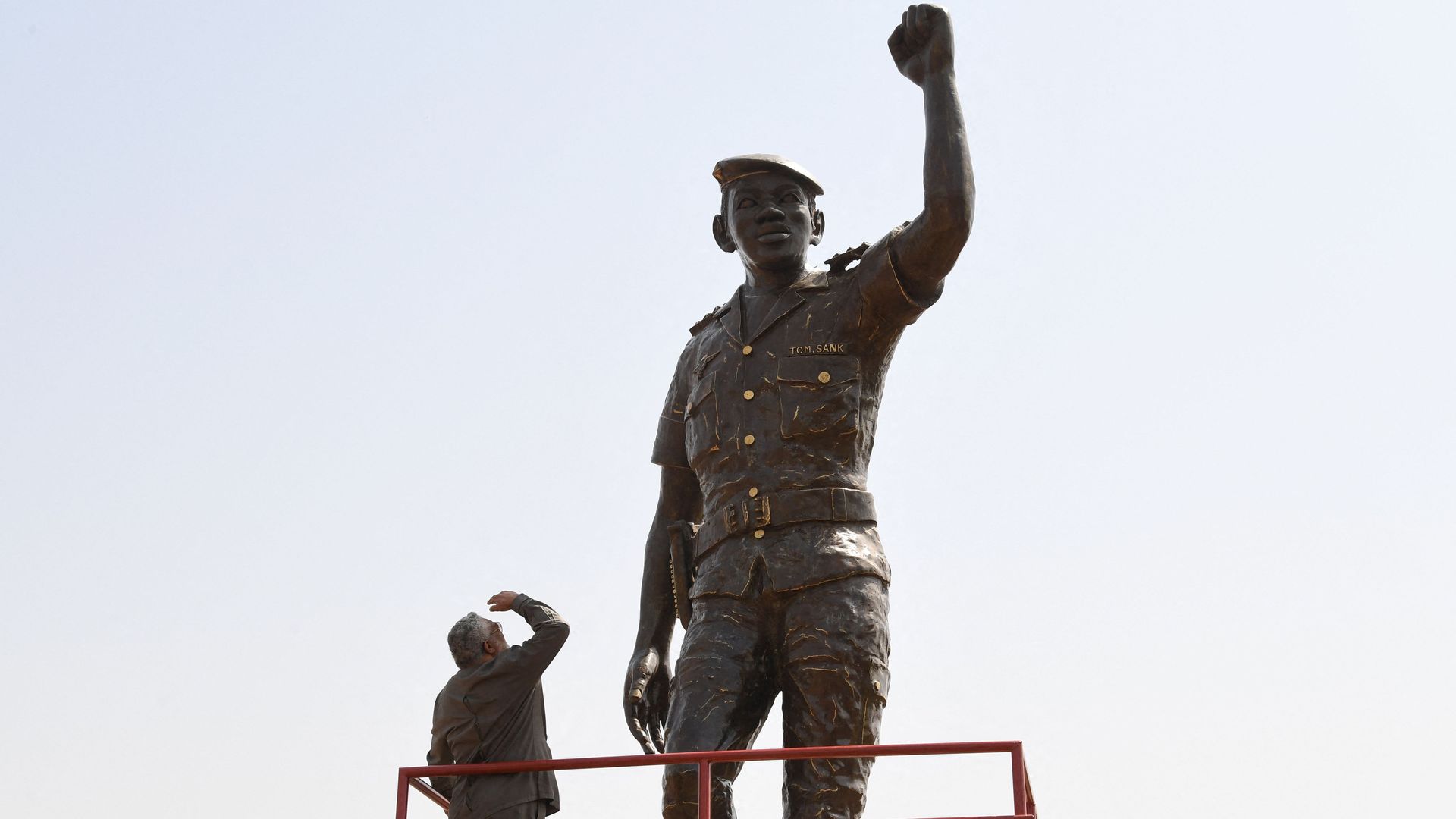 | | | A statue of Sankara in Ouagadougou. Photo: Issouf Sanogo/AFP via Getty | | | | Thomas Sankara has been dead almost as long as he was alive, but the legend of Burkina Faso's former revolutionary-in-chief, who was assassinated at 37, lives on. - A new generation of African politicians has been inspired by his ideas (left-wing, pan-African) and style (a trademark beret).
Driving the news: Sankara's successor and former best friend Blaise Compaoré, who led with an iron fist for 27 years, is being tried in absentia for his murder. - There have long been allegations that France, which saw Sankara as a dangerous radical, had a hand in his death. The country is anxiously awaiting the verdict.
Dive in: The NYT's Declan Walsh examines the trial and Sankara's extraordinary life in a dispatch from Ouagadougou. |     | | | | | | 7. Stories we're watching | 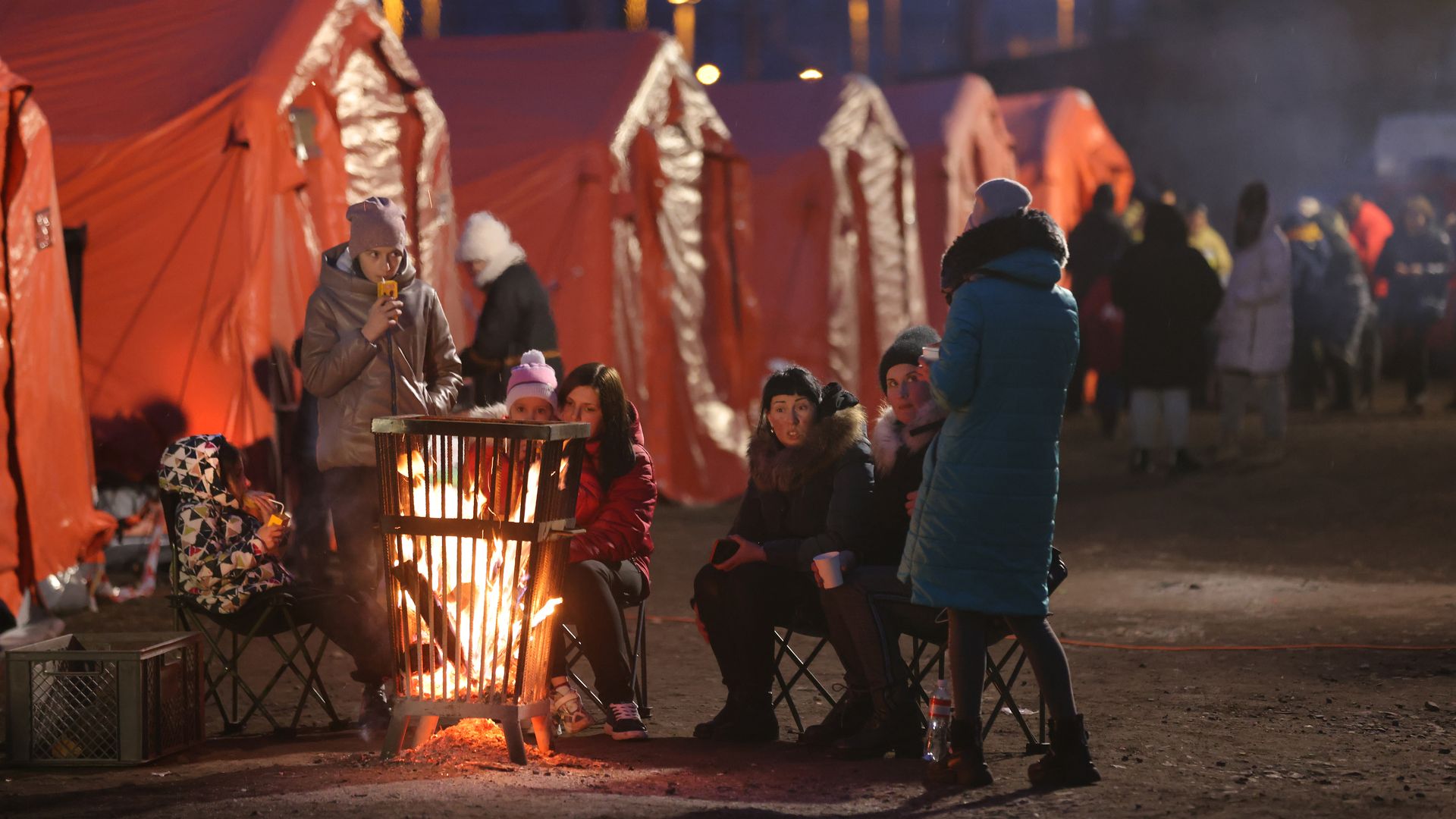 | | | Ukrainian refugees in Medyka, Poland. Photo: Sean Gallup/Getty Images | | | - WHO backs boosters
- U.S. set to miss COVID vaccine donation goal
- Americas report 63% of world's COVID cases
- Thousands evacuate as floods lash Australia
- Israeli president visits Turkey to "reset" relations with Erdoğan
- UN human rights chief to visit China
- Shackleton's lost ship found 107 years after sinking
Quoted: "That gets a green light." — Tony Blinken on Sunday, on Poland sending planes to Ukraine "We do not support the transfer of additional fighter aircraft to the Ukrainian air force at this time." — Pentagon spokesperson John Kirby on Wednesday |     | | | | | | A message from Axios | | Recruit top talent with Axios Local | | |  | | | | Axios Local now has job boards in the fastest growing cities in America. Reach smart professionals that use Axios Local daily to make decisions about where to work, what to do and where to live. Post your job opening on Axios Local. | | | | Answers: 1. Greenland; 2. Black Forest; 3. Red Sea; Red pin = Blue Nile; Purple pin = Yellow River. |  | It's called Smart Brevity®. Over 200 orgs use it — in a tool called Axios HQ — to drive productivity with clearer workplace communications. | | | | | | Axios thanks our partners for supporting our newsletters. If you're interested in advertising, learn more here.
Sponsorship has no influence on editorial content. Axios, 3100 Clarendon Blvd, Suite 1300, Arlington VA 22201 | | | You received this email because you signed up for newsletters from Axios.
Change your preferences or unsubscribe here. | | | Was this email forwarded to you?
Sign up now to get Axios in your inbox. | | | | Follow Axios on social media:    | | | | | |













No comments:
Post a Comment